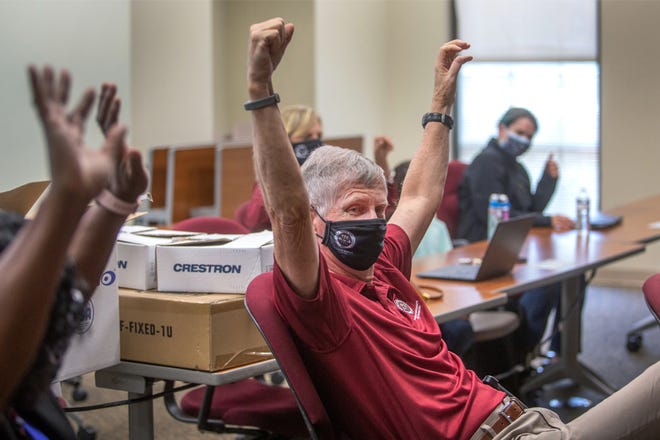Graduating medical students from the Florida State University College of Medicine recently matched to residency programs across the country in many different ranges of medical work.
“The match is a big event because it is their first real job and they end up moving to entirely different cities and states and starting a career,” said graduating medical student Ian Motie, who matched in internal medicine at Sarasota Memorial Hospital.
The National Resident Matching Program is the system that matches applicants to residency programs at teaching hospitals around the country. The last year of medical school, students are working on residency applications and going to interviews. Residency is when graduating medical students who have earned an M.D. are now training to become doctors in a certain specialty.
Usually, medical students travel back to Tallahassee from their rotations to open their offers of residency letters all at once as a class. However, the matching ceremony was virtual this year because of COVID-19. Some students were able to meet up in socially distanced spaces in smaller groups and celebrate together. Others did so with their families at home. A live broadcast was streamed on March 19, so that students could watch from wherever they were, and the Dean of the College, John P. Fogarty, announced the moment when everyone could open their matches.
“Match day was a great experience. My fiancé and I both matched at TMH in Tallahassee,” said 2021 Class President Brian Day, whose specialty is internal medicine. “We went to separate rooms and opened our emails, and then came out and told our families where we had matched.”
This year 117 students registered for matching this year from the College of Medicine. Four students matched with programs that the FSU College of Medicine sponsors in other areas of the state including Orlando, Pensacola, Sarasota, Daytona Beach and Fort Pierce. Another 56 students matched in other areas of Florida, with five matching in Tallahassee.
“As a medical student your main obligation is to learn and study and train. So, now that I am graduating and starting residency, I am excited to take full ownership of patients and learn a lot from them,” Motie said. “You don’t go to medical school to study, you go to become a doctor so it’s exciting to be able to start that.”
Motie mentioned George Rust, who is a professor of Behavioral Sciences and Social Medicine at the college. He is also the director of the Center for Medicine and Public Health and involved with the council on Diversity and Inclusion.
“He has done a lot for the campus and our class to emphasize the importance of patient-centered care, caring for minority populations and understanding the challenges and social deterrents that these populations face that are unique to them. He has been a very inspirational figure in my time in medical school,” said Motie.
The FSU College of Medicine was founded in 2000 with the philosophy of serving the unique needs of Floridians, with a focus on rural areas and the underserved. Students in the school spend two years taking courses at FSU and then are assigned to hospitals for the remaining years before they graduate and move onto residency training.
“I’m super proud and I think it would make the founders proud to see all these people going into primary care specialties,” said Day. A total of 59 graduates matched in primary care specialties in the 2021 graduating class.
Source: https://www.fsunews.com/story/news/2021/03/28/fsu-college-medicine-students-match-residency-training-programs/7036423002/


COMMENTS